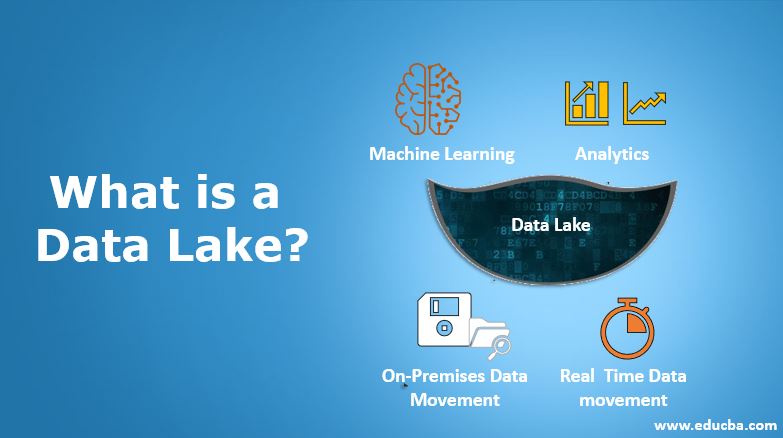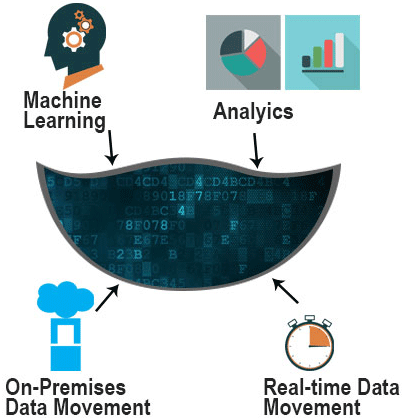Updated June 7, 2023
Introduction to Data Lake
It is a single-point storage system that can accommodate relational data of any format from various data sources; this can then be used to produce the data for analytics and reporting purposes. Standardizing or structuring the data after being picked from the data sources is unnecessary. It can hold standardized or non-standardized, structured or unstructured, processed or unprocessed data from any source, irrespective of the expected outcomes from the data stored in the Data Lake.
Why do we need a Data Lake?
By building a lake, data scientists can see the unrefined data view.
Reasons for using it are as follows:
- The corporation that produces business benefits from its data successfully exceeds its peers. In an Aberdeen survey, the corporation that set up a Data Lake was 9% above similar companies’ organic revenue growth performance. These leaders could perform new types of analytics, such as machine learning through new sources such as log files, clickstream data, social media, and Internet connectivity in the lake.
- It supports the importing of data that comes in real time. Data is gathered from multiple resources and then moved to the lake in the original format. Thus, a lake provides higher scalability of data. Also, you can know what type of data is in the lake by indexing, crawling, and cataloging the data.
- It supports Data Governance, which manages data availability, usability, security, and integrity.
- It can help the Research & Development teams test their hypothesis, refine assumptions, and assess results.
- No silo structure is available.
- It offers customers a 360-degree view and a robust analysis.
The quality of the analysis also increases with the increase in data volume, data quality, and metadata.
- Storage engines such as Hadoop have made it easy to store disparate information. Modeling data with a Lake into a company-wide scheme is unnecessary.
- The quality of analyzes also increases with the increase in data volume, data quality, and metadata.
- It offers business agility.
- Using machine learning and artificial intelligence to make profitable predictions is possible.
Data Lake Architecture on Hadoop, AWS, and Azure
It has two components: storage and calculation. Storage and computing can be either located on-site or in the cloud. This results in the design of a data lake architecture in multiple possible combinations.
1. Hadoop
A distributed server Hadoop cluster solves the big data storage concern. MapReduce is the Hadoop programming model used to divide and process information into smaller subsets in the server cluster.
2. AWS
The AWS product range for its solution is comprehensive. Amazon S3 is at the center of the storage function solution. These Data ingestion tools that allow us to transfer massive amounts of data into S3 are Kinesis Stream, Kinesis Firehose, Snowball, and Direct Connect. In addition to Amazon S3, the NoSQL database, Dynamo DB, and Elastic Search offer a simplified querying process. AWS provides an extensive range of products with a steep initial learning curve. However, the comprehensive features of the solution are widely used in commercial intelligence applications.
3. Azure
Micro-soft offered the data lake. Azure has an analytics and storage layer called Azure Store (ADLS), and the two components that the analytical layer has are Azure Analytics and HDInsight. The ADLS standard was built in HDFS and is storage capable of unlimited. It can save trillions of files more significant than a petabyte in size with a single file. Azure Store enables storing data securely and at scale in any desired format.
Benefits
Some essential points are given below:
- Provides unlimited data type value.
- Adaptable to changes quickly.
- Long-term ownership costs are reduced.
- Its main advantage is centralizing various sources of content.
- Users from different departments around the world can have flexible data access.
- Provides economical scalability and flexibility.
Risk
- It could lose relevance and momentum after some time.
- There is a greater risk when designing.
- It also increases the cost of storage & products.
- Security and access control is the most significant risk. Placing data in a lake without supervision can be problematic, as certain data may require protection and regulation.
Recommended Articles
This has been a guide to What is a Data Lake? Here we discussed the basic concept, architecture, why we need it, and its benefits and risks. You can also go through our other suggested articles to learn more –




